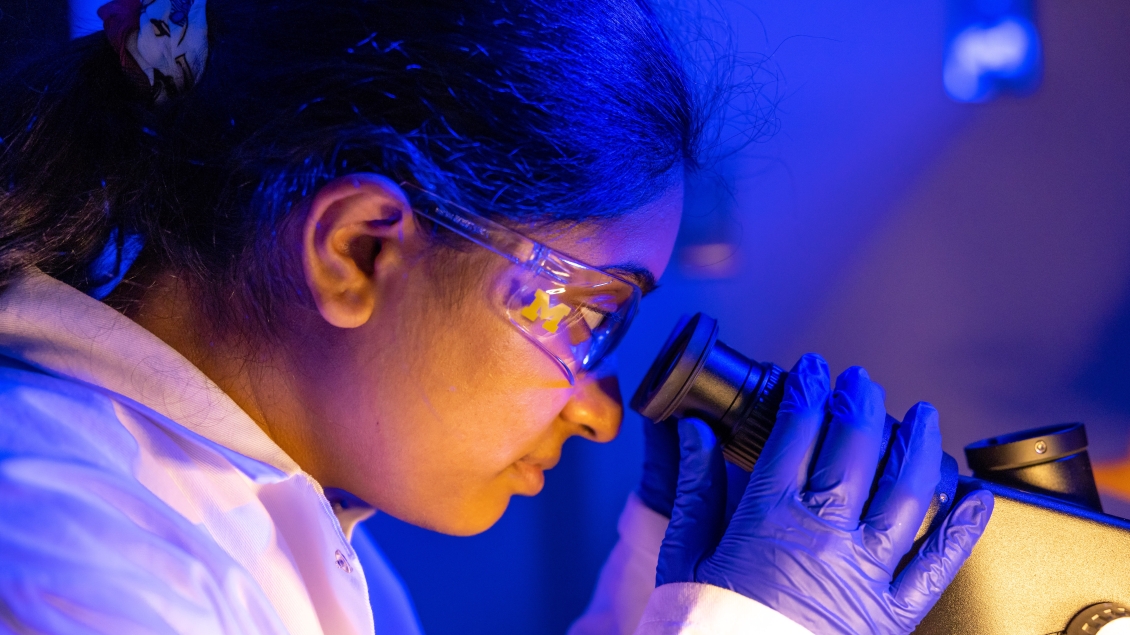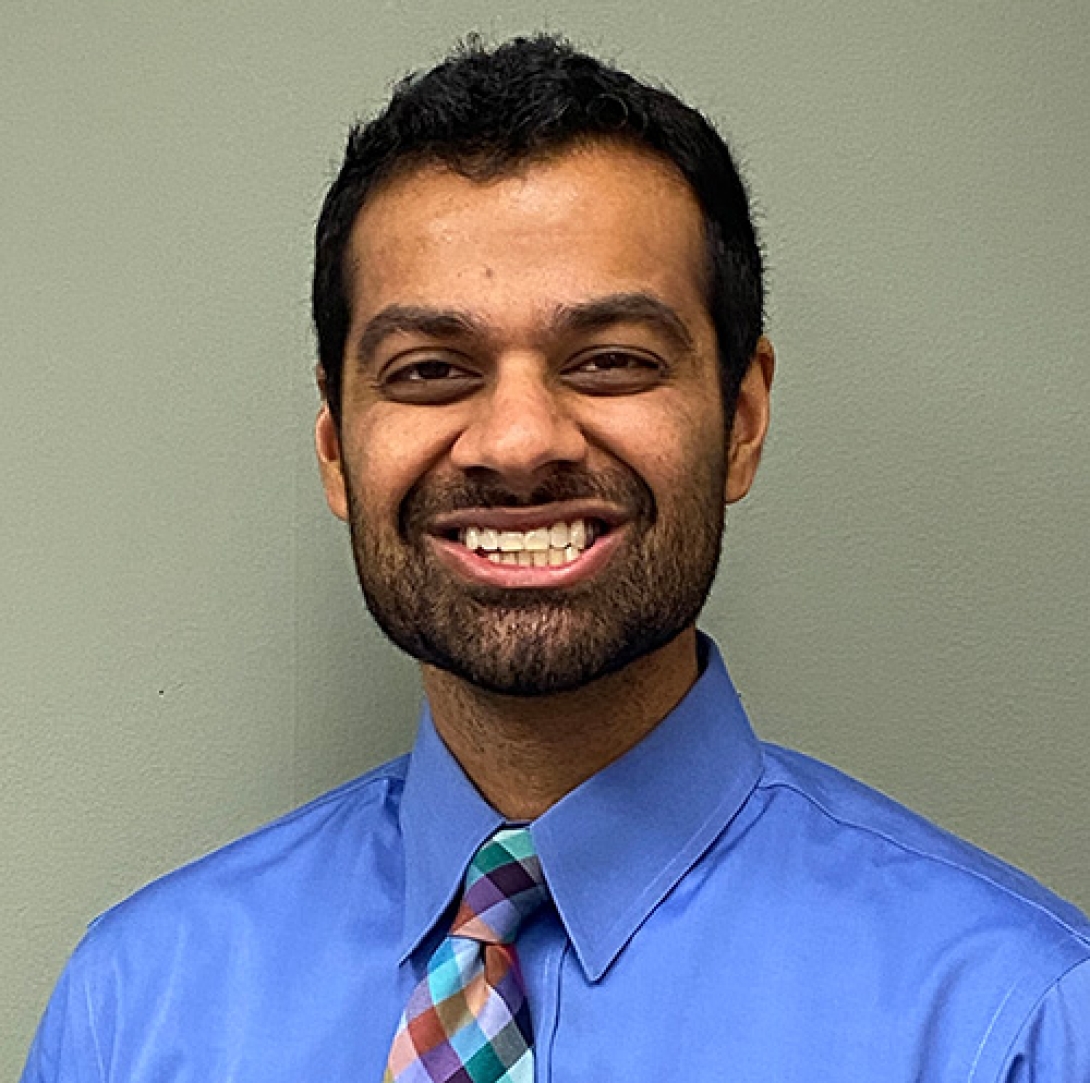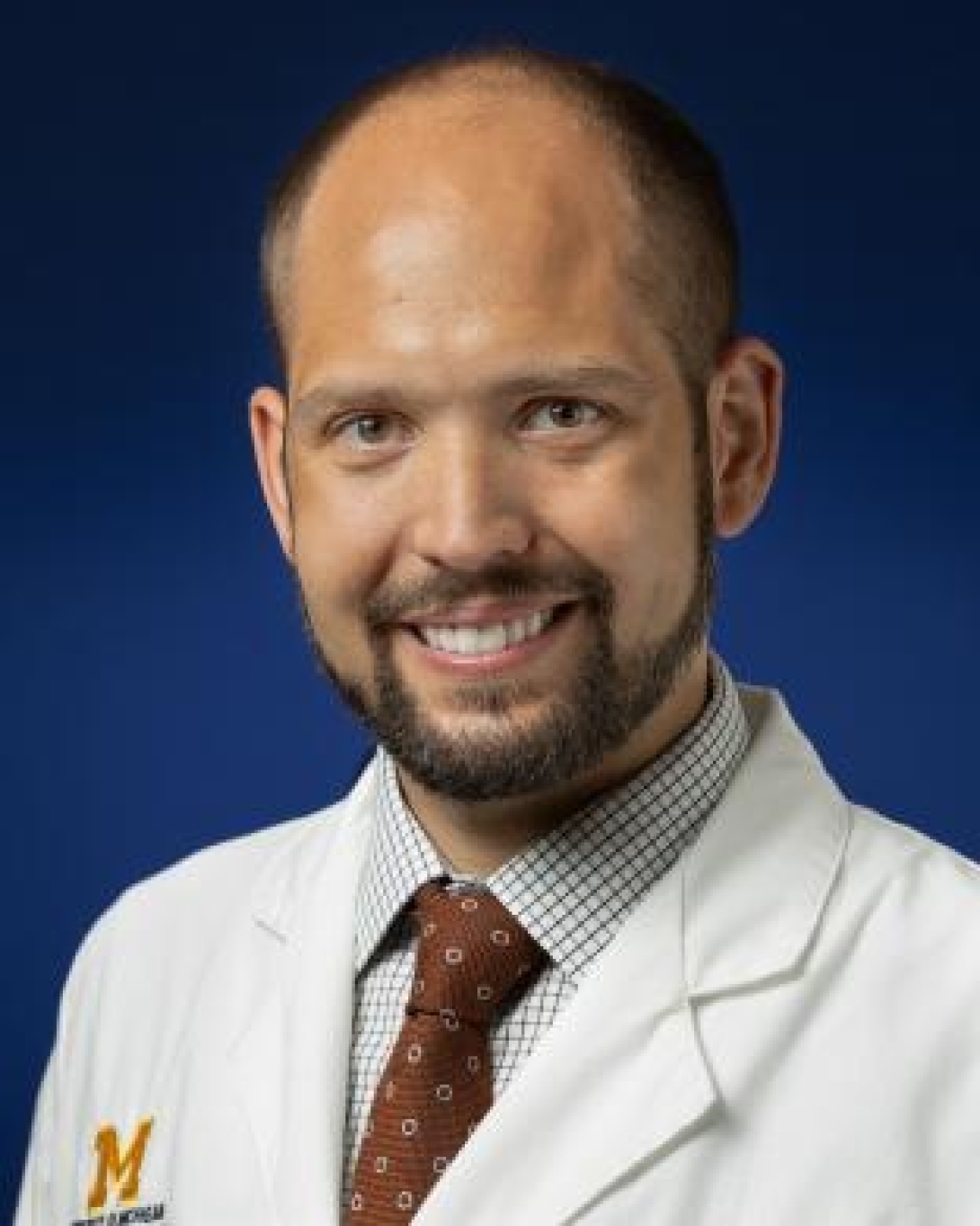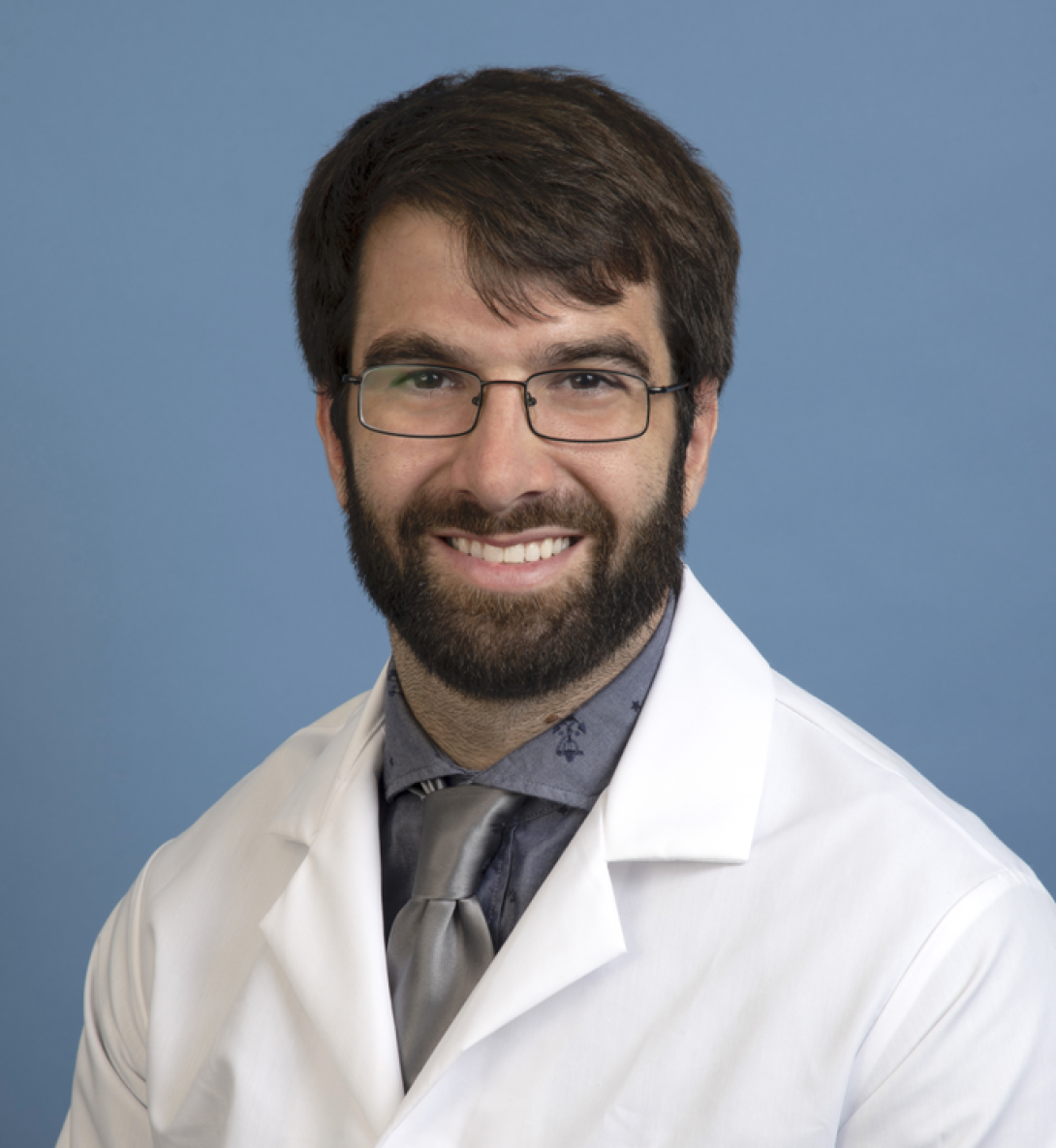
The awardees of the Clinical Neuroscientist Training Program have helped advance research and broaden knowledge at the University of Michigan Medical School.

Biography: My academic and research background has positioned me perfectly to pursue therapeutic development for neurological diseases. I completed my undergraduate work at Northwestern University, focusing on a comprehensive science curriculum, studying not only biology, but incorporating chemistry, physics, mathematics, and computational science. I supplemented this coursework with two major research pursuits - engineering polymer nanoparticles for high-sensitivity DNA detection and then endogenous siRNAs in the brains of D. melanogaster using both traditional biochemical methods and more novel bioinformatics.
The University of Michigan Medical Scientist Training Program then provided me with an opportunity to use my background knowledge to address clinically and scientifically important problems. My research in graduate school under Dr. Jason Gestwicki involved utilizing both chemical and biochemical approaches to understand the role of heat shock proteins in promoting and maintaining the cancer phenotype. This work also involved initial steps in drug development. Upon returning to medical school, I quickly became struck by the devastating effect that neurological diseases had on many aspects of a patient’s life. I found myself further impressed by our limits in treating many of these degenerative conditions, disproportionately so when compared to many other medical specialties and therefore pursued a clinical residency in Neurology at the University of Michigan. During residency, I was exposed to a wide breadth of neurological diseases, including movement disorders.
My clinical work with Drs. Vikram Shakkottai and Henry Paulson alerted me to the incredible need for an improved understanding of movement disorders, and a particular opportunity to help our ataxia patients. Currently, I am completing a multi-disciplinary fellowship in movement disorders. While a large portion of my time is dedicated to seeing patients with an emphasis on hereditary ataxias, I have supplemented this with basic science research in stem cell and genetic technologies under Dr. Vikram Khurana (BWH) as well as clinical trial design and pharmaceutical development with Praxis Precision Medicines, a biotech company based in Boston. Upon returning to the University of Michigan as a Clinical Instructor, I intend to draw upon my diverse, yet in-depth, background to further pursue novel therapeutics for degenerative ataxias.
Project Title: “Discovery and development of potassium channel activators for therapeutic rescue in Spinocerebellar Ataxias”
Project Description: The Spinocerebellar Ataxias (SCAs) are a class of dominantly inherited degenerative disorders causing progressive decline in balance, speech, and gait, often resulting in wheelchair confinement. Currently, no treatment exists for the SCAs, and there is substantial need to improve motor function and slow neurodegeneration. A major hallmark of SCAs is cerebellar Purkinje Cell (PC) degeneration. In SCA mouse models, alterations in PC spiking due to ion channel dysfunction occur concurrently with motor impairment and well before cell loss. Reduced expression and activity of large-conductance calcium-activated potassium (BK) channels underlie these changes in PC membrane excitability in several SCAs. Our group has previously showed that restoring BK channel expression or function rescued membrane hyperexcitability, improved motor dysfunction, and reduced PC degeneration. Therefore, improving BK activity presents an attractive therapeutic strategy in SCA1 and other SCAs.
Traditional ion channel analysis has relied on manual patch clamp, a highly specific but low throughput technique. Using a novel automated patch clamp (APC) instrument at the University of Michigan, we designed a high throughput screen (HTS) to identify BK channel agonists. Primary hits were taken for concentration response curves (CRCs) and followed up in manual cerebellar slice recording. After extensive efforts, only one compound (BK-20) survived this validation process, limiting structure-activity-relationship (SAR) studies.
The next phase of this work will thus focus on 1) expanding our primary screen, which was limited by the COVID-19 pandemic, to increase the number of chemical scaffolds available for SAR analysis and 2) initial pharmacokinetic (PK) studies along with behavioral assays in an SCA1 mouse model. While the long-term goal of this work is to develop therapeutics for SCAs, the objective of this specific project is to generate multiple chemical scaffolds that activate BK and to initialize pre-clinical studies as a proof of concept for future drug development. My central hypothesis is that ion channel dysfunction plays a central role in propagating disease pathology in SCAs and that restoration of BK activity will improve motor dysfunction and delay cellular degeneration.
Project Mentors: Henry Paulson, MD, PhD (primary mentor, UM) and Vikram Shakkottai, M.D., Ph,D. (co-mentor, UTSW)
Biography: Dr Pinarbasi's primary research interest is mechanisms of neurodegeneration, with a special interest in the RNA binding protein TDP-43. She graduated from U.C. Berkeley with a B.A. in mathematics, and completed her MSTP (MD/PhD) training at the University of Texas Southwestern in the lab of Dr. Philip Thomas. Her thesis studies were focused on the intracellular trafficking of TDP-43. She is currently a first year neuropathology fellow.
Project title: Atypical TDP43 splice isoforms: a link between neuronal hyperactivity and neurodegeneration
Project Description: The Barmada lab has recently uncovered shortened splice isoforms of TDP-43 (sTDP) upregulated with neuronal hyperactivity, accumulating in the cytoplasm, and forming insoluble cytosolic inclusions in human neurons. Dr. Pinarbasi will use selective sTDP antibodies to characterize sTDP in neurodegenerative disease associated with neuronal hyperactivity. She will also use induced pluripotent stem cell (iPSC) model system derived from fibroblasts to determine unique protein interactors with sTDP and assess the effect of sTDP loss in the context of neuronal hyperactivity.
Project Mentors: Sami Barmada MD, PhD; Jack Parent MD, PhD
Biography:

Undergraduate School: Grove City College
Graduate School: Penn State College of Medicine, Penn State University (PhD)
Medical School: Penn State College of Medicine, Penn State University
Outside of work I enjoy spending time with my wife Justine and daughter Corinne. My other hobbies include endurance activities, reading, coffee, and eating ice cream.
Fun fact: My favorite Ann Arbor donut location, so far, is DJ's
My theme song: “The Imperial March” by John Williams
Biography: Dr. Srinivasan’s research interests focus on developing targeted therapeutics for neurodegenerative disease. He completed his undergraduate degrees in both Biochemistry and Molecular Biology at Northwestern University. Following this, he enrolled in the Medical Scientist Training Program at the University of Michigan Medical School, earning an MD/PhD upon completion.
During his graduate thesis work, Dr. Srinivasan worked on developing small molecular inhibitors of heat shock proteins towards destabilizing the proteome as a targeted anti-cancer therapeutic. His work helped uncover a novel cell death pathway that may be hijacked by both scientists and clinicians to help therapeutics avoid resistance. Currently, he is completing his neurology residency training and plans to specialize with a fellowship in Movement Disorders.
Project Title: Increasing BK Channel Activity towards Treatment of Spinocerebellar Ataxia
Project description: Spinocerebellar Ataxia is characterized by absent spontaneous firing of purkinje cells in the cerebellum. These deficits in potassium channel activity lead not only to disease symptoms, but also eventual cerebellar atrophy. Using a combination of site-directed mutagenesis, targeted drug design, and high-throughput screening, Dr. Srinivasan will work towards identifying compounds that improve BK channel activity leading to both symptomatic relief and disease modifying therapies for these devastating diseases.
Project mentors: Vikram Shakkottai, MD, PhD.; Vince Groppi, PhD
Biography: Dr. Chua's primary research interest is in neurodegenerative disease, with a special focus on pathways of protein quality control and their impact on disease pathogenesis. After completing his undergraduate degree in Biology and Classical Studies at Brown University, Dr. Chua earned his MD and PhD through the Medical Scientist Training Program at the University of Michigan Medical School. His thesis work investigated the influence of SUMOylation and macroautophagy on disease pathogenesis in spinobulbar muscular atrophy, or Kennedy's disease. His work was supported by the F31 Ruth L. Kirschstein National Research Service Award through the National Institute of Neurologic Disorders and Stroke. He is currently undergoing residency training in neurology at Michigan Medicine and plans to specialize in Movement Disorders.
Project Title: Characterizing the molecular and cell-specific determinants of neuronal autophagy
Project description: Using an induced pluripotent stem cell (iPSC) model system derived from fibroblasts of amyotrophic lateral sclerosis (ALS) patients, Dr. Chua will determine the specific RNA and protein effectors that differentially regulate neuronal autophagy compared to non-neuronal cell types. These studies will provide crucial information for targeting neuronal autophagy in a novel, highly specific fashion for therapy development in ALS and other neurodegenerative diseases.
Project mentors: Sami Barmada, MD, PhD; Lois Weisman, PhD
Biography: Dr. Chen is primarily interested in cell based therapies for neurologic diseases. Dr. Chen completed his undergraduate education at Johns Hopkins University, where he worked extensively with Prof. Lee Martin on Motor Neuron Disease. He received his MD from Duke University, and entered the Neurosurgery Residency at the University of Michigan. Dr. Chen was supported by the UMCNTP for 2 years during his residency to pursue research on cell based therapies. He is presently a Fellow in Functional Neurosurgery at Stanford University.
Project Title: Inhibitory synapse formation and reversal of excitotoxicity in amyotrophic lateral sclerosis (ALS): a potential mechanism for human spinal cord stem cell transplantation
Project Description: Dr. Chen developed methods to differentiate human embryonic stem cells into inhibitory neurons. The ability of these cells and other human embryonic stem cells to modify neurodegeneration in models of ALS was evaluated. Dr. Chen assessed whether the effects of human embryonic stem cell transplantation are mediated by modulation by excitotoxic injury.
Project Mentor: Eva L. Feldman, MD, PhD
Biography: Dr. Sas is interested in mechanisms of injury and repair in traumatic brain injury, particularly closed head injury. He received his undergraduate education at Dickinson College. He earned his M.D. and Ph.D. degrees at the Medical University of South Carolina with his dissertation work on HIV encephalopathy. He entered the UMCNTP during his Neurology residency at Michigan. He was supported by the UMCNTP during and after residency, concurrently pursuing a fellowship in Sports Neurology. He was appointed to the Neurology faculty at Michigan in 2018 and is the recipient of a K08 award from the National Eye Institute.
Project Title: Immune-driven repair pathways following traumatic injury to the central nervous system
Project Description: Dr. Sas studied axonal regeneration in an optic nerve crush model of traumatic injury. Intraocular inflammation enhances axonal outgrowth in this model. Dr. Sas established that the beneficial effects of intraocular inflammation are secondary to influx of a distinct population of circulating white cells. He is presently isolating the specific molecular factors mediating the beneficial effects of these inflammatory cells.
Project Mentor: Benjamin Segal, MD

Biography: Wesley Kerr, MD, PhD, is a clinical seizure specialist and biostatistical researcher. He completed his physician-scientist training and neurology residency at UCLA and worked with Mark S Cohen and John M Stern for his research. He completed clinical epilepsy fellowship at the University of Michigan in 2022. His research work focuses on helping clinicians make better medical decisions with data, with an emphasis on patients with functional seizures, otherwise known as psychogenic nonepileptic seizures (PNES), and statistical analysis of clinical trials.
Project Title: Advancing Clinical & Neuroimaging Markers of Functional Seizures
Project Description: For his R25 work, Dr. Kerr is working on identifying data-driven clinically meaningful subgroups of patients with functional seizures (FS), using neuroimaging to identify multimodal biomarkers of FS, and evaluating how computer-aided diagnosis of FS interacts with clinicians' impressions.
Project Mentors: William Stacey, MD, PhD, Lubomir Hadjiyski, PhD, Nicholas Beimer, MD, and Jian Kang, PhD

Biography: Dr. Elafros is dedicated to a career improving access to neurologic care for resource-limited populations. She completed her MD/PhD in epidemiology at Michigan State University, where she first began working in Zambia characterizing the burden of new-onset seizures and epilepsy in HIV-positive adults as well as patient, caregiver and health care provider understanding of common neurodiagnostic tests such as lumbar puncture.
Dr. Elafros then entered adult neurology residency at Johns Hopkins Hospital where her first year of R25 support examined barriers to care for adults with suspected meningitis in Lusaka, Zambia. In 2020, she moved to the University of Michigan for a fellowship in neuromuscular disease. While Dr. Elafros continues to work in Zambia, during her second year of R25 support at Michigan, she launched a study examining the prevalence and risk factors for peripheral neuropathy in Flint with local collaborators at Hurley Medical School.
Project Title: The Flint Neuropathy Study
Project Description: Peripheral neuropathy is a highly prevalent, disabling condition that to pain and reduced quality of life. Studies examining neuropathy have largely focused on specific groups, such as adults with diabetes, and none have focused on Black and low-income populations, therefore little is known about the burden of disease in this group. The Flint Neuropathy Study is an ongoing study examining the prevalence, risk factors, and management of neuropathy among primary care patients at Hurley Medical Center in Flint, Michigan. Our goal is to improve the diagnosis and management of neuropathy in this population to improve quality of life.
Project Mentors: Brian Callaghan, MD, MS and Lesli Skolarus MD, MS